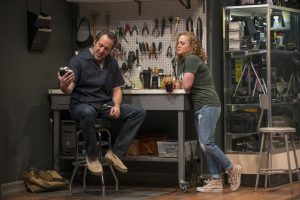FINDING FOCUS
Linda Vista is billed as “an adult comedy about immature behavior.” Surprisingly tender, Tracy Letts’ Steppenwolf stunner examines one man’s mid-life crisis from all sides and, best of all, from inside out. Sardonically struggling against himself as much as the world, Dick Wheeler is Letts’ most developed anti-hero.
Named after the San Diego condo complex that’s Wheeler’s new home (it beats living in his ex-wife’s garage), Linda Vista delivers perfect proof of Socrates’ warning that the unexamined life is not worth living. And when you’re in an edgy world premiere by the often corrosive Tracy Letts (August: Osage County, Superior Donuts, Killer Joe, Man from Nebraska, Mary Page Marlowe, Bug) and it’s scorchingly staged by Dexter Bullard, the “examination” equals tough love times ten.
Letts is unrivaled at depicting losers in seemingly irreversible tailspins, careening into catastrophes that audiences crave like a fix. The feat in Linda Vista is that the playwright cares about this 50-year-old ex-portrait photographer from Chicago, enough to spare Wheeler the usual Letts-lethal crash and burn. Allergic to bullshit, especially his own, Wheeler (Ian Barford, mired in a self-deprecating funk) is outspoken and opinionated, self-loathing and self-destructive, paranoid and narcissistic—and his self-salvation by play’s end is a wonder worth the wait.
For almost three hours Todd Rosenthal’s ever-varying revolving stage takes us through Wheeler’s snug home with its postage-stamp glimpse of the Pacific. In this “man cave” this man-child who repairs cameras in a Nikon outlet, denounces Trump at any opportunity, and prefers Stanley Kubrick films to contemporary fluff, seeks solace from his own storm—or, as he puts it, “a skid that’s lasted 15 years.”
One of Wheeler’s romantic casualties describes the unwittingly vulnerable survivor as a “turtle who doesn’t know he’s lost his shell.” Convinced that people are blind to insincerity and ripe for rip offs, Wheeler is a cameraman who’s lost his focus or, as he puts it, a caterpillar who can never graduate to butterfly.
This sporadically likable sadsack tells us (perhaps too glibly) much about himself because, well, when you’re beyond shame there’s nothing to hide. We discover his painfully unfinished divorce with Kelly, who demands confiscatory alimony and custody of their porn-craving 14-year-old son Gabe; his reflexively misogynistic affairs that always end with “He was humiliated”; and the many matters that trigger his ire. Wheeler’s patient chum Paul (Tim Hopper) won’t waste advice on this “mess” because Wheeler is going to do what he’s going to do: “Grab whatever happiness you can: You’ll fuck it up anyway.”
Linda Vista puts Paul’s prediction to many tests—and it’s fascinating to watch Wheeler pass and fail. It helps that Letts surrounds him with foils who doggedly define him by sheer contrast. There’s his semi-suicidal passive-aggressive boss Michael (deadpan deadly Troy West), a womanizing louse; his younger workmate Anita (Caroline Neff, a Valley Girl minus any attitude) who gives Wheeler a wide berth but unexpected insights; and Paul’s wife Margaret (Sally Murphy), unaware of her loveless marriage as they indulge in karaoke duets. She’s also onto Wheeler.
Most revealing are the two women who come into Wheeler’s life, sadly simultaneously, and move the plot as much as the revolving stage. Wheeler meets Jules (Cora Vander Brook, engagingly complex) on a blind date set up by Paul and Margaret. She’s a life coach with a master’s degree in “happiness,” though her luck in love all but revokes it. Her struggle to open Wheeler up to the joy of singing makes a Rubik’s cube seem simple.
Jules’ roller-coaster romance with Wheeler is no simple stage story: It forces the audience to take sides, a turning point in breaking bad. (There’s nudity aplenty to illustrate the intimacy.) Equally engaging is Wheeler’s seemingly improbable involvement with a flaming-haired, “rockabilly”-loving neighbor half his age. Pointlessly pregnant, Minnie (Kahyun Kim, too needy to be nice) has been kicked out by a boyfriend she can’t let go. She wins Wheeler’s heart as well as his home, but wanly warns, “I promise I will hurt you.”
Suddenly this middle-aged “chick magnet” named Wheeler faces Dorothy Parker’s deadly question: “What fresh new hell approaches?” The outcome of Wheeler’s “elective affinities,” as Goethe describes open-ended obsessions, really matters. So does the way Wheeler learns to break his free fall. Linda Vista ends with as redemptive an ending as Letts can manage, an indulgence that audiences could get used to.
When Wheeler finally comes to care (the “about” part doesn’t matter), well, we’ve been there long before. Bullard’s cast of seven give Letts’ conditional nuances, gut-busting revelations (like Paul’s hilarious circular reasoning), dour wisecracks, and painfully human “humiliations” everything the script requests and requires. (Alone worth the price of admission is Paul’s putdown of the “deathbed” cliché where you measure your life’s worth by your final moment.) A floor plan on how to frustrate failure, Letts’ truth harvest is a very bumper crop.
photos by Michael Brosilow
Linda Vista
Steppenwolf Theatre Company
Steppenwolf’s Downstairs Theatre, 1650 N Halsted St
ends on May 21, 2017 EXTENDED to May 28, 2017
for tickets, call 312.335.1650 or visit Steppenwolf
for more shows, visit Theatre in Chicago








